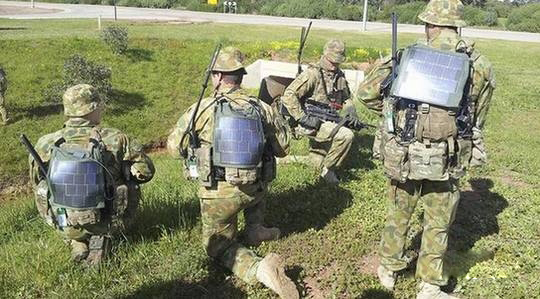The Canberra Times website reported on August 27th, 2014 that Emma Kelly reported that due to the development of solar-powered backpacks, the Australian Army was able to get rid of the heavy battery burden in just a few years.
In a recent 72-hour training mission, the soldiers tested the bendable "SLIVER" solar cell technology and proved it can be used for commercial sales.
Although 6-cm-long silicon cells may be small—they are only 1.5 mm wide—but when combined, they can make various electronic devices, from GPS devices to night-vision goggles, work for many years.
Professor Andrew Blakers, professor at the Australian National University and director of the Centre for Sustainable Energy Systems, said that "back packs" can not only reduce the load on soldiers but also extend the duration of the mission.
"If you carry fewer batteries, you carry lighter weight, or you carry the same weight but have longer endurance," he said.
"I've heard that soldiers sometimes carry thousands of grams of batteries. If you can eliminate most of the batteries and replace them with rechargeable batteries, you can save a lot of batteries."
"When performing long-lasting missions, the solar panel will not run out. It just keeps recharging so that you have power available for the days, weeks or months of the mission."

Military trials of solar backpack technology developed by the Australian National University (ANU)
Although the sun is best, solar panels can limit or even eliminate the exhaustion of batteries in cloudy weather, he said.
The technology has developed into the Defence Science and Technology Organisation (CSIRO) and the Commonwealth Scientific and Industrial Research Organisation (CSIRO), a defence and security systems company, and Tectonica Australia has a funding of 2.3 million. Part of the dollar cooperation project.
Due to the unusual nature of the experiment, the Australian National University began to commercialize project results with industry partners.
Although this kind of solar cell may enter the military market in the next two to three years, it is expected to attract a wider customer base like many military resources.
"A large number of civilian products are suitable for this light, flexible battery," Professor Blacks said.
"There is not much difference between soldiers in the wild and jungle hikers in the wild - neither want to carry glass modules in their backpacks."
Scientists at the Australian National University originally developed these cells with glass - but bending flexibility makes the center think of the possibility of applying plastics.
The result is a battery that can be woven into a fabric, easily bent, and light in weight, such as a wearable backpack-type battery tested by soldiers, or like a card that can be folded and then placed. material.
Professor Blacks said that solar panels can also supply remote sensors such as miniature cameras for many years.
"You can't do this with batteries."
Small Size Tempered Glass,Painted Glass,Printing Tempered Glass,Small Tempered Glass
SHANDONG TOP LEADER GLASS CO.,LTD , https://www.topleaderglass.com